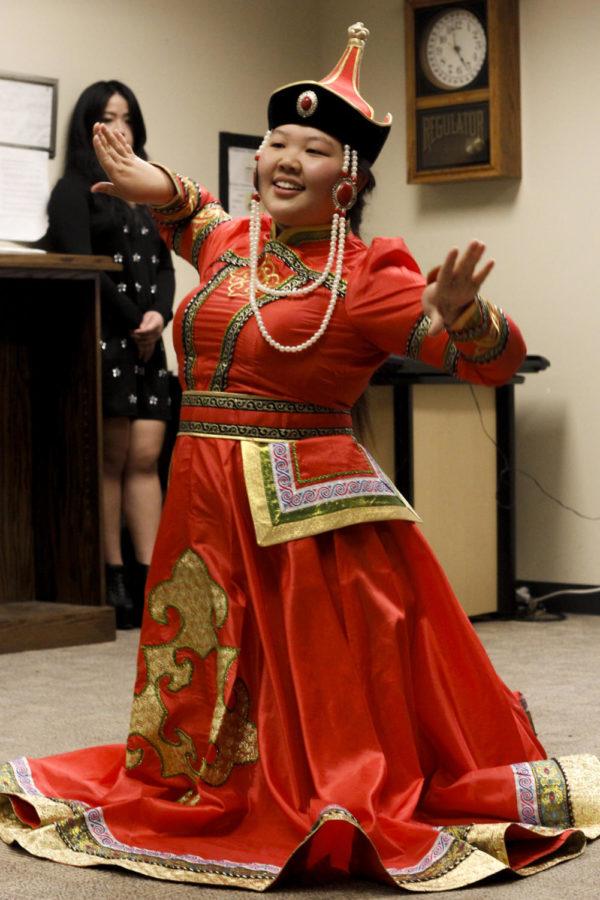Greenlee School graduate students celebrate Chinese New Year with faculty, staff
Tomhas Huhnke/Iowa State Daily
Terigele, a graduate student, performs a traditional dance from Chinese culture in part of the celebration at the Greenlee School of Journalism and Communication on Feb. 7. Students and faculty gathered to commemorate the Chinese New Year by eating and watching performances from a multitude of students.
February 10, 2014
It’s one of the happiest times at the Greenlee School of Journalism and Communication, said director Michael Bugeja. On Friday, Chinese graduate students celebrated the Chinese New Year with Greenlee faculty and staff for the fourth time at Iowa State.
They presented their culture in a variety of activities and performances. According to the lunar calendar, 2014 marks the “year of the horse,” which signifies power, victory and energy.
“We started this celebration four years ago, so that our Chinese students could feel more at home,” Bugeja said. “But what happened is that they really defined what home means for us.”
Bugeja said that the whole idea of cultural exchange for journalists is important, because they need to have a global world view.
“We can’t just cover the Hawkeyes and Iowa State, we need to cover the whole world,” Bugeja said. “The Chinese students share what our other students might do one day as reporters.”
The event opened with a video explaining the origins of Chinese New Year and Greenlee faculty members saying “Happy new year” in their respective native language.
The graduate students presented a variety of different poetry recitals and traditional Chinese songs, most of which originated in the 18th century.
Terigele, graduate student in journalism and mass communication, presented a Mongolian dance, dressed in a traditional dress, while graduate student Xiaowen Zhu focused on a Bai ethnic dance.
“There was some stuff I’ve never even seen before such as a performer who played on a two-stringed instrument,” Bugeja said. “He was astoundingly good and to hear all these different kinds of sounds out of an instrument like that is unbelievable and extremely fascinating.”
In between the performances, faculty and staff were invited to take part in various games such as a Chinese letter puzzle and “Guess Who I Am,” where they had to guess Chinese objects based on various hints.
In “Have It Right Away,” faculty members were encouraged to draw their wishes for the new year on a picture of a horse. Their wishes included world peace, money and happiness for their families.
“The Chinese words for ‘on the back of the horse’ can also mean ‘immediately’ or ‘right away,’” said Sicong Zhao, emcee of the event and graduate student in journalism and mass communication.
According to Chinese tradition, people draw their wishes on the back of a horse, when they want it to be fulfilled right away, Zhao said.
In the end, the audience had the opportunity to participate in Chinese cooking and make their own tangyuan, a traditional Chinese snack made out of sticky rice filled with glue pudding.
“I think everything went quite well, I’m glad to see all the people so happy, they enjoyed themselves,” said Shan Luo, graduate student in journalism and mass communication.
Luo said she would have preferred if everyone came in traditional Chinese costumes and clothing.
“Some of the first-year grad students came in their normal everyday clothes, so it would have made for a better feeling of being together and connected,” Luo said.
Daniela Dimitrova, associate professor in journalism and mass communication, and director of graduate education, said that she has been to all of the Chinese New Year celebrations.
“I’ve seen the progression. Every year, they have different games and different activities, so I feel like I’m learning something new about the Chinese culture every time,” Dimitrova said.







